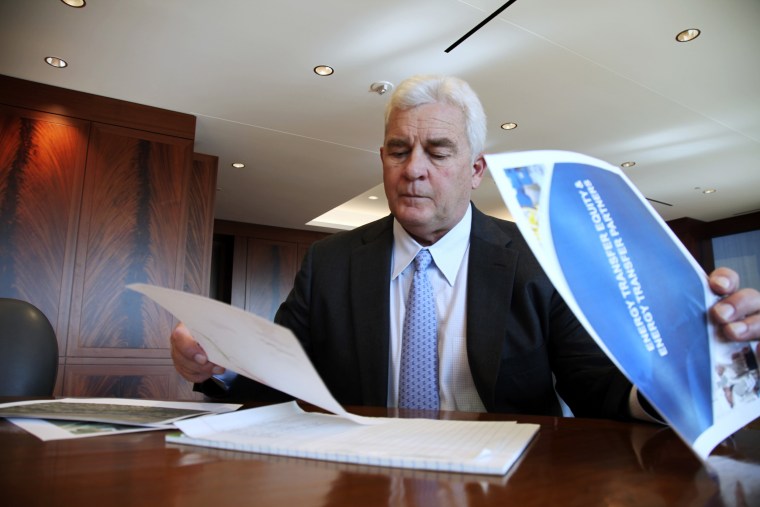CANNON BALL, North Dakota — News that the federal government ruled against a controversial North Dakota pipeline project was greeted with singing and roars of joy among protesters.
In the Oceti Sakowin camp, native and non-native alike danced to celebratory drumming that blasted through loudspeakers.
But reality soon began to sink in among the thousands who have been fighting the construction of the 1,172-mile Dakota Access Pipeline for months, which the Standing Rock Sioux tribe and others say endangers local drinking water and would disturb sacred tribal sites.
"You know it's hard to get excited," said Stevey Seymour, a member of the Colville Tribes. Seymour said she was worried the decision could be easily overturned by President-elect Donald Trump's administration.
Here's what may be next for the protesters and Energy Transfer Partners, the Dallas-based company building the pipeline, after the U.S. Army Corps turned down the permit for the project.
What can Trump do?
Trump can overturn Sunday's U.S. Army Corps of Engineers' decision.
Trump supported the completion of the pipeline, according to an aide's memo recently obtained by the Associated Press. A spokesman, Bryan Lanza, said in the memo that Trump's backing for the pipeline “has nothing to do with his personal investments and everything to do with promoting policies that benefit all Americans.”
In general, Trump has pledged to invest in infrastructure projects. During the campaign, he also supported the Keystone XL oil pipeline, which has also prompted opposition.
"This is a temporary celebration ... With a new government it could turn and we could be at it again."
In an interview with NBC News in November, Energy Transfer Partners CEO Kelcy Warren said he was "100 percent sure that the pipeline will be approved by a Trump administration."
"I believe we will have a government in place that believes in energy infrastructure," he said.
In June, Warren donated $100,000 to the Trump Victory Fund, a joint fundraising committee for Trump's campaign, and a further $3,000 directly to the Trump campaign. For his part, Trump's campaign financial disclosure forms revealed the President-elect's investments totaling between $500,000 and $1 million in Energy Transfer Partners.
A spokesperson for the president-elect's office was not available for comment.
Any legal options for Energy Transfer Partners?
In its statement Sunday night, Energy Transfer Partners did not threaten legal action against the Corps. That may be because the company, at least right now, would have a weak case in court, said Deborah Sivas, an environmental law professor at Stanford University.
"The statement was clear: a final decision has not been made," Sivas told NBC News. "Unless they find themselves before a very sympathetic judge, they don't have a case with no finality to a decision."
The language in the Corps decision, Sivas added, both concedes that the company has met all the legal requirements while also recognizing a "heightened duty to tribes and protecting their lands."
An Energy Transfer spokesperson declined to comment on the possibility of the company taking legal action against the government.
According to Sivas, however, there may be a political route for the company in the absence of legal recourse.
"I suspect that they have the ear of the transition team," said Sivas. "If I were advising them, I would say your political strategy is likely to be more successful than your legal options at this point in time."
What could Energy Partners do?
The Dallas-based company financing the $3.7 billion project does not look to be backing down.
"The Administration’s statement today that it would not at this time issue an 'easement' to Dakota Access Pipeline is a purely political action," read a statement by the company Sunday.

The company went on to say that it expected "to complete construction of the pipeline," noting that "nothing this Administration has done today changes that in any way."
When asked by NBC News whether the company would be willing to pay any fines to the government if they continued construction, an Energy Transfer Partners spokesperson said "it would not."
These fines would be slapped on Energy Transfer Partners if the company defies the Corps of Engineers' orders and drills under Lake Oahe, a large Missouri River reservoir. That stretch required an easement from federal authorities.
Will the pipeline be re-routed?
The Army Corps assistant secretary for civil works, Jo-Ellen Darcy, said in a statement Sunday that the Corps based their decision permission to the company "on a need to explore alternate routes for the Dakota Access Pipeline crossing."
The pipeline would cross 90 to 115 feet below Lake Oahe with double walled and remote-controlled shutoff valves on each side of the crossing. The Standing Rock Sioux Tribe, whose reservation lies just a half-mile from where the pipeline would be constructed, has for months said the pipeline would destroy the area's water supply and ancient sacred sites dating back 15,000 years.

Standing Rock Sioux Chairman Dave Archambault II has called for a pipeline re-route — a request that has been rejected on numerous occasions by Energy Transfer Partners.
The tribe's worry the pipeline would destroy sacred sites and compromise its water supply "were not based on the facts," Energy Transfer Partners' Warren told NBC News.
Warren has also told NBC News that there was no guarantee an oil spill would not happen, but the pipeline would be prepared to withstand such an event.
The U.S. Army Corps of Engineers has said it will look at possible alternate routes, although any other route is also likely to cross the Missouri River.
What will pipeline opponents do next?
The U.S. Corps of Engineers decision to deny the permit to Energy Partners was welcomed, albeit cautiously, by those opposing the construction.

Brian Cladoosby, the president of the National Congress of American Indians, called the move a victory for "all of Indian Country" that showed "respect for tribal sovereignty and a true government-to-government relationship."
Still, the new Trump government would bring with it renewed struggle, according to Charlotte Bad Cob, from the Pine Ridge Reservation in South Dakota.
"This is a temporary celebration. I think this is just a rest," she told Reuters. "With a new government it could turn and we could be at it again."

